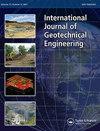Desiccation cracks prediction using a 3D finite elements model
IF 2.3
Q2 ENGINEERING, GEOLOGICAL
International Journal of Geotechnical Engineering
Pub Date : 2023-02-07
DOI:10.1080/19386362.2023.2202595
引用次数: 1
Abstract
ABSTRACT This paper focuses on the cracking of fine soil grains by desiccation using a 3D hydro-mechanical model. It further seeks to study the cracks growth across the depth during the desiccation time. Numerical results provide data for assessing the depth propagation of the cracks, field suction in 3D, the tensile stresses caused by the cracks. Cross sections have been considered to determine the cracks’ depth. Furthermore, water content and suction versus time have been obtained. It is still challenging to experimentally obtain a sample’s suction, water content, and distribution of stresses. Although there is a gap between numerical and experimental results concerning the appearance time of the first crack, the interpretation given in the text demonstrates that it is a wrong gap. Consequently, it can be stated that the numerical results agree with the experimental results, in terms of cracks intensity factor (CIF) and the evaporation rate as functions of desiccation time.基于三维有限元模型的干燥裂纹预测
摘要本文利用三维水力力学模型研究了细颗粒土壤干燥后的开裂问题。它进一步试图研究干燥期间裂纹在整个深度上的生长。数值结果为评估裂纹的深度扩展、三维场吸力和裂纹引起的拉应力提供了数据。已考虑横截面来确定裂缝的深度。此外,还获得了含水量和吸力随时间的变化。通过实验获得样品的吸力、含水量和应力分布仍然具有挑战性。尽管关于第一个裂纹的出现时间,数值结果和实验结果之间存在差距,但文中给出的解释表明这是一个错误的差距。因此,可以说,在裂纹强度因子(CIF)和蒸发率作为干燥时间的函数方面,数值结果与实验结果一致。
本文章由计算机程序翻译,如有差异,请以英文原文为准。
求助全文
约1分钟内获得全文
求助全文
来源期刊

International Journal of Geotechnical Engineering
ENGINEERING, GEOLOGICAL-
CiteScore
5.30
自引率
5.30%
发文量
32
 求助内容:
求助内容: 应助结果提醒方式:
应助结果提醒方式:


